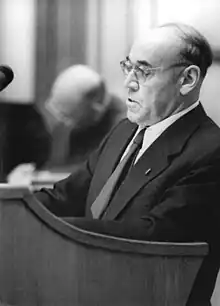Paul Scholz
Paul Scholz (2 October 1902 – 23 June 1995) was a German journalist and politician. He held various cabinet posts in East Germany.
Paul Scholz | |
|---|---|
 | |
| Personal details | |
| Born | 2 October 1902 Braunau, Silesia |
| Died | 23 June 1995 (aged 92) Zeuthen, Germany |
| Political party |
|
Early life and education
Scholz was born in Braunau on 2 October 1902, and his father was a farmer.[1] Scholz was a primary school graduate and worked at a factory following his graduation.[2]
Career and activities
Scholz was a member of the Communist Party of Germany and arrested several times after the Nazis came into power.[1] He became a member of the editorial board of the newspaper of the Communist Party in June 1945 and worked for various newspapers until 1950. He was a member of the East German Parliament from 1950, and his tenure lasted until 1981.[2]
Scholz joined the Socialist Unity Party of Germany in April 1946 and worked as the editor-in-chief of the newspaper Der freie Bauer (German: The Free Farmer).[1] Between July 1949 to 1953 he served as the vice chairman of the Democratic Farmers' Party of Germany which was cofounded by him in June 1948.[1][3]
Scholz was appointed minister of agriculture and forestry in November 1950 succeeding Ernst Goldenbaum in the post and was in office until May 1952.[4] He was succeeded by Wilhelm Schröder in the post.[4] Scholz was the head of the coordination and control center for agriculture, forestry and water management between May 1952 and November 1953.[4] He was the deputy chairman of the East German Council of Ministers between May 1952 and July 1967.[4][5] He was again appointed minister of agriculture and forestry in November 1953, replacing Hans Reichelt in the post.[4] Scholz's tenure ended in March 1955 when Hans Reichelt was reappointed minister of agriculture and forestry.[4] Scholz was a member of the Central Executive the Land and Forestry Union from 1957.[2]
Scholz became the president of the Friendship Association between East Germany and Arab countries in 1963 and visited the United Arab Republic in this capacity in 1967.[2][6] He became the vice president of the Peoples' Friendship League in 1967.[2] He retired from politics and public posts in 1967.[2]
References
- "Paul Scholz. Politiker in der DDR". Munzinger-Archiv (in German).
Taken from Internationales Biographisches Archiv 11/1968; 4 March 1968
- "Scholz, Paul" (in German). Bundesstiftung Aufarbeitung. Retrieved 3 August 2023.
- Tao Chen (August 2018). "East German pragmatism, China's policy of differentiation, and Soviet miscalculation: Hermann Matern's 1961 trip to China revisited". Cold War History. 19 (1): 91. doi:10.1080/14682745.2018.1483341.
- Ursula Hoffmann-Lange (1971). Die Veränderungen in der Sozialstruktur des Ministerrates der DDR: 1949-1969 (in German). Düsseldorf: Droste Verlag. pp. 35, 60, 95, 98, 101. ISBN 978-3-7700-0281-8.
- Lorenz M. Lüthi (2016). "The Non-Aligned Movement and the Cold War, 1961–1973". Journal of Cold War Studies. 18 (4): 115. doi:10.1162/JCWS_a_00682. JSTOR 26925642.
- Lorena De Vita (September 2017). "Overlapping rivalries: the two Germanys, Israel and the Cold War". Cold War History. 17 (4): 360. doi:10.1080/14682745.2017.1322580.
- "Scholz, Paul" (in German). Deutsche Biographie. Retrieved 3 August 2023.
External links
 Media related to Paul Scholz at Wikimedia Commons
Media related to Paul Scholz at Wikimedia Commons